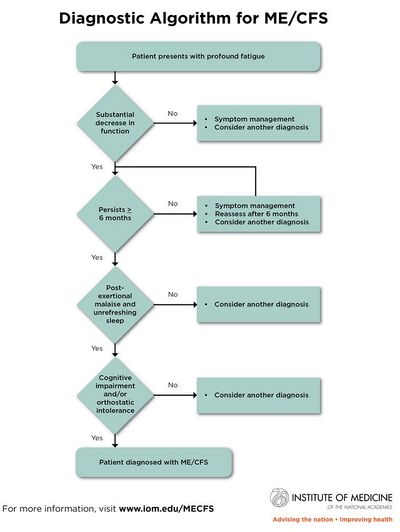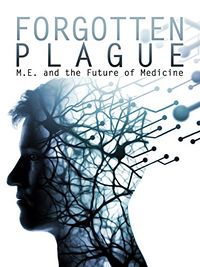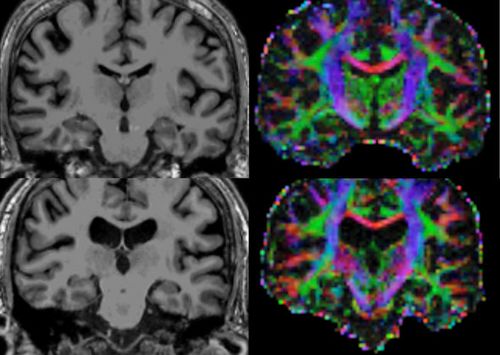Primer for the public
Editors: Edits to this Primer may require the same edits to the other Primers. |
Primer for the public offers a broad audience detailed information on myalgic encephalomyelitis (ME) and chronic fatigue syndrome (CFS), complex, chronic, and poorly understood medical conditions. ME was first categorized as a neurological disease by the World Health Organization (WHO) in 1969.[1] CFS was first formally defined by the United States Centers for Disease Control and Prevention (CDC) in 1988 as a framework for researching unexplained chronic fatigue (CF) associated with a mononucleosis-like syndrome. There remains a lack of consensus among members of the medical and research communities regarding the equivalence of ME and CFS. Some believe that CFS is intended to describe the same disease entity as ME, while others believe that they are distinct illnesses but with overlapping symptom profiles. In deference to this lack of consensus, the combined term ME/CFS is often used.
The core ME/CFS symptoms are: post-exertional malaise (PEM), chronic fatigue (CF), unrefreshing sleep/sleep problems, and cognitive impairment/brain fog and/or orthostatic intolerance (OI).[2][3] A patient can have many more symptoms[4] and meet different criteria. Systemic Exertion Intolerance Disease (SEID), an ME/CFS criteria, allows for a patient to be diagnosed with the minimum core symptoms[5][6] and the patient may have other symptoms.[6]:9 The Canadian Consensus Criteria (CCC) requires the core symptoms and neurological, autonomic, neuroendocrine, immune system, and myalgia symptoms to meet its ME/CFS diagnostic criteria.[7] The International Consensus Criteria (ICC) is used to diagnose myalgic encephalomyelitis (ME) which requires the core symptoms and neurological, immune/gastrointestinal/genitourinary impairment, and energy metabolism/ion transport impairment symptoms for a diagnosis.[8]
Although the Fukuda[9] and the Oxford Criteria[10] are used for diagnosing chronic fatigue syndrome (CFS), they are both overly broad and there is criticism that patients are being misdiagnosed in both clinical and research settings as having CFS when in fact they are suffering from the symptom chronic fatigue (CF).[8][11][9][12] There have been media reports of athletes diagnosed with ME or CFS who have recovered in a relatively short period of time after rest, supplementation, and diet changes;[13][14][15][16] these athletes may have had overtraining syndrome (which has the symptom of CF) and not ME, CFS.[17] Some people with adrenal failure, idiopathic chronic fatigue, or other fatiguing illnesses are erroneously diagnosed with CFS.[18] CF is a symptom of many diseases, and illnesses, and should not be confused with the grossly misnamed disease CFS.[7]
The acronym ME/CFS is widely used in research, clinicians, and patient organizations, and patients.
"The most common overlapping condition with ME/CFS is fibromyalgia."[19][20] While some have posited ME/CFS and fibromyalgia are variants of the same illness, Benjamin Natelson, MD summoned considerable amounts of data that suggest the two illnesses differ with different pathophysiologic processes leading to different treatments.[21]
Unfortunately, a psychiatric approach has been taken with ME/CFS, but this is changing. At this time there are no approved drug treatments. Graded exercise therapy (GET) and cognitive behavioral therapy (CBT) are being abandoned in the UK due to ineffectiveness and high rates of harm.[22][23] The CDC website states "ME/CFS is a biological illness, not a psychologic disorder" and impacts multiple body systems.[24] The CDC recognizes the hallmark symptom of PEM which is a worsening of symptoms after physical, mental or emotional exertion[2] and says ME/CFS is a "disabling and complex disease."[4]

Disease onset and course of illness
ME/CFS can begin from many acute/sudden[25] events: usually viral or bacterial infections, but also trauma, surgery or childbirth, allergic reaction, and stress.[26] There is also a gradual onset in some people,[25][27] that is not attributed to any one event. Occasionally, ME/CFS has been triggered by environmental toxins or the receipt of an immunizing injection.[28] Some say that the disease ME always has an acute/sudden infectious onset.[29]
The disease ME/CFS is often diagnosed when a person who does not recover from a flu-like illness, mononucleosis or another herpesvirus, Q fever, an unidentified virus, or other infection meets one or more diagnostic criteria for either ME, CFS, or ME/CFS.[30][31] Patients experience numerous symptoms and disease severity which fluctuate from day to day, week to week, month to month, year to year, and even decade to decade. Furthermore, symptoms and disease severity vary among patients.[28][32]
The CDC recognizes that there can be different causes and it is possible that two or more things could cause the illness. Areas of research include infections, immune system changes, stress affecting body chemistry, changes in energy production, and a possible genetic link.[33][24] The CDC notes there are abnormalities with the immune system, cellular metabolism, neuroendocrine disturbances, and blood pressure or heart rate regulation.[24]
Not a mental health disorder
In the past, CFS was believed to be a mental health disorder. This is why the CDC now states: "ME/CFS is a biological illness, not a psychologic disorder. Patients with ME/CFS are neither malingering nor seeking secondary gain. These patients have multiple pathophysiological changes that affect multiple systems."[24]
No clear evidence that ME/CFS is contagious
Infectious episodes have led to outbreaks over the years and 72% of ME/CFS patients report an onset of a viral or bacterial infection.[26] Nowadays, the vast majority of ME/CFS cases are sporadic rather than epidemic, and although some outbreaks have been caused by known viruses - such as the SARS pandemic and COVID-19 - there is no clear evidence that sporadic ME/CFS cases are contagious.[34]
Families, partners, and friends do not report contracting ME/CFS from someone with the disease nor do patients report passing it on to others.[35] However, Underhill and O'Gorman (2006) researched 219 patients with ME/CFS, and concluded that close household contact and genetics were both risk factors for CFS, finding 3.2% of spouses/partners of those with CFS also had the illness.[36] This was a higher prevalence than all genetic relatives except children of patients. Because ME/CFS can run in families, a genetic link is a line of research recommended by the CDC.[33]
Michael Sikora and collaborators at the Open Medicine Foundation hope that their research on the role of T cells and immune-related genes will help address "whether ME/CFS is an autoimmune or infectious disease, or simply an activation of the immune system".[37]
Blood donation and organ transplant
A tissue and blood donation ban is in force for ME/CFS in the United Kingdom (even if recovered),[38] Australia,[39] New Zealand,[40] most of Canada,[41] and for a time also in the United States,[42] initially due to the research on XMRV as being the likely infectious trigger of CFS[43] and showing that patients carried the virus.[42] Two papers on XMRV were retracted as the result was caused by laboratory contamination,[44][45] but many blood donation bans remain.[41]
The US American Red Cross no longer has statements barring transfusions or transplants for CFS,[46] but patients are expected to be in "good health" which would exclude most.[46] The American Association of Blood Banks advises to either accept or defer ME/CFS donors based on "clinical judgment of the donor's health status".[47] Patient charities discourage ME/CFS patients from donating blood,[48]
Mini-Docs
What happens when you have a disease doctors can't diagnose By Jen Brea/TED
Five years ago, TED Fellow Jen Brea became progressively ill with myalgic encephalomyelitis, commonly known as chronic fatigue syndrome, a debilitating illness that severely impairs normal activities and on bad days makes even the rustling of bed sheets unbearable. In this poignant talk, Brea describes the obstacles she's encountered in seeking treatment for her illness, whose root causes and physical effects we don't fully understand, as well as her mission to document through film the lives of patients that medicine struggles to treat.[49][50]
Invisible Illness - Stories of Chronic Fatigue Syndrome By Veronica Weber/Palo Alto Online
This mini documentary reveals 3 stories of people who have been impacted by Chronic Fatigue Syndrome - a little known disease that affects roughly 836,000-2.5 million people in the U.S. and receives little research funding. They share emotions of treating loved ones with the disease, their frustrations of being ignored by members of society and the healthcare industry and express hopes of treatment and research. Video by Veronica Weber/Palo Alto Online[51]
Diagnosis and Management of Myalgic Encephalomyelitis and Chronic Fatigue Syndrome By Dr. David Kaufman/Unrest
This video on the diagnosis and management of myalgic encephalomyelitis and chronic fatigue syndrome is part of the Unrest Continuing Education module, made available through the American Medical Women's Association and Indiana University School of Medicine, and in partnership with #MEAction. US medical providers can visit: https://www.unrest.film/cme to register to watch Unrest online for free and receive Continuing Education credit.[52]
Epidemiology
In the United States, 836,000 - 2.5 million people suffer from ME/CFS. "The total economic costs of ME/CFS are estimated at $17 to $24 billion annually."[6] Some CFS patients can work with job accommodations but between 1 in 3 and 1 in 2 patients become unable to work and many rely on SSDI/SSI.[53][54][55]
- All races and cultures are afflicted with ME/CFS.[56][57] Children and adolescents are also diagnosed.[58][59]
- Like many autoimmune and neuro-immune diseases where mostly women are afflicted,[60] the ME/CFS female/male patient ratio per Capelli et al. is 6:1[61] while the CDC states 4:1.[57]
- Pediatric ME/CFS is defined by the CDC[62] and the National Academy of Medicine (NAM)[63] although it is usually diagnosed in adults.[4] "Children below the age of 8 or 9 do not have the symptom pattern of adolescents past puberty. If the onset of the disease occurs during adolescence, the most common time of onset, the pattern is similar to that of adults."[64] The prognosis in adolescents is considered to be better than in adults.[65][34] Children are diagnosed with ME/CFS at three months of illness under SEID and CCC and ME is diagnosed immediately under ICC.[66][6][7][8]
- "Worldwide, there may be as many as 17 – 24 million people with ME/CFS."[67] 25% of ME/CFS patients are housebound or bedbound at some point in their illness.[68][3]:32 and 90% of people with ME/CFS are undiagnosed.[4]
- The prognosis for a patient diagnosed with ME/CFS isconsidered to be poor with only a minority (a median estimate of 5%) returning to pre-morbid levels of functioning.[69] The majority of patients remains significantly impaired. A substantial improvement however is noted in an estimated 40% of patients.[69][70]
Symptoms
Symptom presentation varies enormously between individuals. Symptom presentation also varies within individuals, as individuals often report that symptoms change over time (increasing or decreasing) and new symptoms may appear while others disappear.[2] There are many symptoms which people with ME/CFS experience, though those listed below are the core symptoms found in all patients.






- Post-exertional malaise (PEM) is the hallmark symptom of ME/CFS. After physical mental or emotional exertion (which for some patients can be a shower or making out a to-do list, others grocery shopping, socializing or reading a news article, while some just walking to the mailbox, getting to the doctor or mentally following a T.V. program)[2][74] there is a payback or worsening ME/CFS symptoms which can be delayed 24-72 hours, or sometimes more[2][75][76] and can last 24 hours and even days, weeks, or months.[77][78] The patient will experience even greater fatigue as well as exasperate the flu-like symptoms and body pain. Every patient experiences different symptoms and symptom severity from different activities and exertion output according to how sick he or she is with the disease.[4][32] Regarding PEM the CFIDS Association of America states:
This is a term which describes a symptom in which exercise or exertion can bring on malaise (illness). In the case of people with ME/CFS, malaise often occurs during a period some 24-72 hours after exertion. For example, in some cases, a short walk can worsen ME/CFS symptoms two days later. This lack of understanding about the delayed onset of symptoms has, in the past, made it harder to test for ME/CFS. Follow up tests, taken less than 24 hours after an initial exercise test, may show that the patient can still perform activities at the same level (before post exertional malaise has a chance to take hold).[79]
- orthostatic intolerance (OI) such as postural orthostatic tachycardia syndrome (POTS) or neurally mediated hypotension (NMH)
- unrefreshing sleep/sleep disturbance[5][6]
Other possible symptoms
- chronic pain
- immune system
- neurological signs and symptoms See also: neuroinflammation
- List of symptoms in ME/CFS
Comorbids
- fibromyalgia (FMS)
- irritable bowel syndrome (IBS)
- multiple chemical sensitivity (MCS)
- temporomandibular joint disorder (TMJ)[80]
Government guides on symptoms
US Government guides on symptoms
Canada guides on symptoms
Tests
- Natural killer cell (NKC) Blood Test
- Sleep study for sleep apnea, restless leg syndrome, and other sleep disturbances.
- Tilt table test for OI or POTS.
Drugs, treatments, and therapies
There are currently no Food and Drug Administration (FDA) approved treatments for ME/CFS. Treatments consist mostly of symptom management, rather than treatment of the underlying cause of the disease, which is not yet understood. There are many potential treatments, though their evidence base is limited, as most research into treatments has gone into unsuccessful psychological approaches to treatment.
Drugs

Two treatments that have garnered much attention are Ampligen, produced by AIM ImmunoTech (formerly Hemispherx Biopharma), and Rituximab. Many people have reported enormous improvements from Ampligen, and a few recovered but relapsed when they stopped taking it.[81]
Attempts to obtain FDA approval for Ampligen in the US have failed, but it is available to some people on compassionate use.[82] Argentina approved the use of Ampligen for severe ME/CFS in 2016.[83][84] Also in 2016, it was made available on a limited basis in Europe.[85] In July 2018, Hemispherx Biopharma, Inc announced the expansion of its Treatment Protocol/Expanded Access Programs (compassionate use) for ME/CFS in the United States, known as AMP-511, to new patients.[86] AMP-511 "will allow treatment of up to 100 ME/CFS patients at any one time at approved clinical infusion therapy sites."[87]
Rituximab, a lymphoma drug, had shown promising results in initial trials in Norway,[88] and there were groups crowdsourcing funding for further trials in other countries. In 2017, Drs. Øystein Fluge and Olav Mella announced that their Rituximab trial had failed. They stated that they would focus their efforts on attempting to identify a subgroup of ME/CFS patients with an immune profile that would be responsive to Rituximab.[89] A phase III trial published in 2019 showed Rituximab does not improve ME/CFS.[90]
Jarred Younger announced in March 2016 that he would be undertaking a trial of low dose naltrexone (LDN) in ME/CFS.[91]
Treating other conditions
Different forms of OI are treated with beta-blockers (Metopropol), Fludrocortisone (Florinef), and Pyridostigmine.[7] When treating other diseases, illnesses, and conditions, and ME/CFS comorbidities or overlapping conditions such as sleep difficulties, cognitive problems, pain, and other symptoms it is important to remember that patients are sensitive to medications.[92] The CDC advice to health care practitioners is to be aware that because all drugs can cause side effects, ME/CFS patient symptoms can worsen. "This is particularly true of any medication that acts on the central nervous system, such as sedating medications: therapeutic benefits can often be achieved at lower-than-standard doses. Patients with ME/CFS might tolerate or need only a fraction of the usual recommended doses for medications. After initial management with lower dosing, one or more gradual increases may be considered as necessary and as tolerated by the patient."[92] For instance, tricyclic drugs can improve mood and help with sleep and pain. However, in some in can worsen OI.[92]
Controversy

.
Until recently psychiatry has taken an inappropriate lead and treatment path for a biological disease. In the UK, graded exercise therapy (GET) and cognitive behavioral therapy (CBT) were employed by ME Clinics until 2021. Exercise exacerbates symptoms and can further harm patients.[22][93] Depression and anxiety drugs have been utilized, usually with poor results.[7][19]
Treating a biological disease as a mental illness is not cost-effective. The drugs are expensive and biomedical research is not pursued. People struck down and disabled with ME/CFS are labeled with a mental health issue; disability insurance, having clauses excluding a mental health illness/disease, stop any payment or shorten the payout time-frame.[94][95][96]
Graded exercise therapy & Cognitive behavioral therapy

.
Until 2021, GET and CBT were typically employed in the UK, Ireland and some parts of Europe through ME Clinics. They are highly controversial and not recommended by patients, patient advocates, and research organizations nor by many doctors or researchers outside of the UK.[23] Based on the flawed PACE trial which used the flawed Oxford criteria to diagnose and recruit patients, GET and CBT found its way into treating people with ME/CFS.
Exercise, especially GET, can harm an ME/CFS patient further.[22]
- Jennifer Brea walked home from her Neurologist's office and became wheelchair-bound.
- This is an experience of serious harm due to GET shared by K. Miles, via Tom Kindlon on Twitter.
- Emma Shorter was able to walk a few minutes a day until GET put her in a wheelchair.
- Doctor Speedy was also seriously harmed by GET.
Claims of curative treatments
Charlatans claim they can cure CFS (per the CDC "there is no cure"[97]) when in reality they may be able to treat chronic fatigue (CF). ME/CFS patients experience an ongoing improper immune response and other medical abnormalities for at least 6 months straight with a reduction in activity with a specific symptom set for at least 50% of the time.[24][98][99]
Additionally, there have been media reports of some athletes diagnosed with CFS that recovered in a relatively short period of time after rest, supplementation, and diet changes,[13][14][15][16] these athletes may have had overtraining syndrome,[17] while some people with anemia, allergies, idiopathic chronic fatigue or other fatiguing illnesses can be misdiagnosed with CFS.[7]
Working with government to move forward
Advocates met with senate staffers the week of March 16, 2016, and discussed research and drug development by the National Institutes of Health (NIH), the Centers for Disease Control and Prevention (CDC) reinstating and increasing funding and education based on Institute of Medicine report recommendations and the Health and Human Services (HHS) funding to develop Centers of Excellence.[100] #MEAction reports on this ongoing process.
CDC Website updates
- Jul 3, 2017, the CDC's Chronic Fatigue Syndrome page has been changed to Myalgic Encephalomyelitis/Chronic Fatigue Syndrome (ME/CFS) and GET and CBT recommendations have been removed.[101][102]
- Jul 12, 2018, the "Information for Healthcare Providers" tab and its sub-tabs were updated.[103][104]
- Feb 25, 2019, Dr. Elizabeth Unger, Chief of CDC's Chronic Viral Disease Branch (CVDB), that houses the ME/CFS program, in collaboration between Medscape and the CDC put out brief video and commentary page with links to the CDC's July 12th, 2018 updates for medical professionals: Chronic Fatigue Syndrome: It's Real, and We Can Do Better.[105]
MEAction input
- Jul 29, 2018, CDC Revises its Information on ME #MEAction report on the CDC July 2017 and July 2018 website updates. Recommendations for the CDC's ME/CFS page have been created from patient feedback on the updates as well as asking for further patient input.
Recommended viewing
Documentary
Films
- Forgotten Plague is a US documentary about Ryan Prior, an afflicted journalist who investigates the disease and its history and why the CDC has left millions sidelined from life; available for streaming and DVD purchase. (2015)

- Unrest is a US documentary film that aired on PBS's Independent Lens in 2018 and is available for streaming and DVD purchase. Jennifer Brea, a person with ME, directs. (2017)

Short film
- The Last Great Medical Cover Up is a UK short Film on Vimeo with several patient interviews. (2015)
News media
- Chronic Fatigue: Missing Millions (Carte Blanche DSTV) TV report, South Africa (2017)
Talks and interviews
- Jennifer Brea is interviewed for the upcoming BRIC Flix on her ME/CFS disease experience and her 2017 documentary film Canary in a Coal Mine (now called Unrest) at 5:30 and 10:20. (2016)
Recommended reading
Government health organizations
- US
- Centers for Disease Control (CDC)
- ME/CFS in Children Fact Sheets (2017) Fact Sheets for Healthcare Professionals, Parents/Guardians, Education Professionals
- Institute of Medicine (IOM)
- Beyond Myalgic Encephalomyelitis/Chronic Fatigue Syndrome Redefining an Illness Report Brief on the Institute of Medicine report. (2015)
ME/CFS research foundations
- UK
- US
ME/CFS organizations
- Australia
- UK
- Tymes Trust (Pediatric)
- Get the Facts about ME/CFS (2016)
- What is ME/CFS? (2013)
- International
- MEAction
- Reports and Fact Sheets (2015)
Other organizations
- National Organization for Rare Disorders (NORD) has a section for Myalgic Encephalomyelitis
Other reading
- What Do You Do When a Loved One Becomes Chronically Ill? By Suzan Jackson
History
1980's to present day
- Osler's Web is a book by Hillary Johnson on the early history of CFS.
- Thirty Years of Disdain by Mary Dimmock and Matthew Lazell-Fairman picks up on the ME/CFS history where Osler's Web leaves off.
Deaths of ME/CFS patients
Death certificates with ME or CFS
- Merryn Crofts' death is attributed to ME.
- Sophia Mirza's death is attributed to CFS.
In the UK, United States, and Australia there are reports of loved ones who have died due to ME/CFS.[106]
Disease names and acronyms around the world
The United States and Australia usually refer to the disease as CFS, (chronic fatigue syndrome). Many European countries, the United Kingdom and Ireland mostly use the name ME, (Myalgic Encephalomyelitis). Most countries, as well as doctors and researchers worldwide, will also use the acronym ME/CFS. See: Definitions of ME and CFS.)
The symptom chronic fatigue (CF) should not be used in place of the name chronic fatigue syndrome (CFS); this has been a source of confusion of CF the symptom and CFS the disease. CFS is a grossly misnamed disease whereas CF is a symptom of many diseases, illnesses and drug therapies.[107][108] Dr. Jarred Younger explains chronic fatigue and begins by stating "Fatigue is not a disease and it is not even a symptom. So fatigue is a alarm system and the most general alarm system the body has." Webinar with Jarred Younger, Ph.D. (@6:04-7:54)
Myalgic Encephalomyelitis (ME)
Although many similar diseases have occurred for centuries, in the 1920s - 1940s there were sporadic outbreaks around the world[109], of both poliomyelitis, and what Dr. Melvin Ramsay called 'Benign Myalgic Encephalomyelitis' ('benign because it is disabling but not usually fatal). In 1969, the World Health Organisation included "Myalgic Encephalitis' in its 'International Classification of Diseases' (ICD), under the category 'Diseases of the Nervous System', code G93.3.[110][111]
From ME to CFS
Incline Village, Lake Tahoe, NV, US, experienced an outbreak during 1984-1985. The CDC were sent to investigate. Dr. Anthony Komaroff studied cases from the outbreak and eventually he and a body of clinicians settled on the name "Chronic Fatigue Syndrome".[112] Dr. Komaroff discusses the name emerging in the documentary film Forgotten Plague.
From CFS to 'any unexplained fatigue'
Various groups invented new definitions, that required only 'medically unexplained fatigue' such as Reeves criteria and Oxford criteria. Fatigue is a common symptom in any population, with many different causes. These new definitions allowed some psychiatrists to claim that CFS could be 'cured' through exercise and positive thinking which has been promoted through the PACE trial and that this 'cure' also applied to people who are severely ill with Myalgic Encephalomyelitis.[113][114]
SEID name and diagnostic criteria
Systemic Exertion Intolerance Disease (SEID) is a diagnostic criteria proposed by the Institute of Medicine (IOM) in the Institute of Medicine report. This clinical criteria was developed for doctors in the United States to diagnose at 6 months instead of years or even decades. Doctors are encouraged to perform tests prior to six months, such as a Tilt table test or sleep study if symptoms require further investigation. Treating symptoms such as orthostatic intolerance or a sleep disorder can begin prior to the six months needed to diagnose.[3]
Different diagnostic criteria used worldwide
Currently used
- Canadian Consensus Criteria (CCC)
- Fukuda criteria (Sometimes referred to as CDC Criteria)
- International Consensus Criteria (ICC)
- Oxford criteria
- Reeves criteria (Sometimes called Empirical definition)
- SEID or IOM 2015 (Used by CDC on their ME/CFS Diagnostic Criteria for Healthcare providers page.)[23]
Currently not in use
The different criteria used from one doctor to another and researcher to researcher results in confusion for doctors trying to diagnose, poor research and discord between patients, medical professionals, and charitable organizations. Adding to the confusion is a clinical criteria will at times be used in research and a research criteria used by a clinician to diagnose. Many US researchers will use Fukuda (using the PEM "option") and CCC in a single research project.[115] The NIH Post-Infectious ME/CFS Study will be using four: SEID, Fukuda, CCC and Reeves.[116] The ME/CFS community wanted to participate in this study's design.[117][118]
Notable studies
- 2019, Evidence of widespread metabolite abnormalities in Myalgic encephalomyelitis/chronic fatigue syndrome: assessment with whole-brain magnetic resonance spectroscopy[119]
- 2018, ME/CFS Involves Brain Inflammation: Results from a Ramsay Pilot Study[120] (TALK)
- 2016, Metabolic features of chronic fatigue syndrome
- 2015, Daily cytokine fluctuations, driven by leptin, are associated with fatigue severity in chronic fatigue syndrome: Evidence of inflammatory pathology[121] - (Full text)
- 2015, Right Arcuate Fasciculus Abnormality in Chronic Fatigue Syndrome[122]
Bilateral white matter atrophy is present in CFS. No differences in perfusion were noted. Right hemispheric increased FA may reflect degeneration of crossing fibers or strengthening of short-range fibers. Right anterior arcuate FA may serve as a biomarker for CFS.

See also
- Severe and very severe ME
- Pacing - a key way to manage ME/CFS
- List of abnormal findings in ME/CFS
- Fibromyalgia
- Primer for family, friends and care providers
- Primer for patients
Learn more
Potential treatments and research
- Ampligen Used in Argentina for the treatment of severe ME/CFS.
- Brain imaging
- Natural killer cell
- Vagus nerve infection hypothesis
Guides and reports
- Caring for People with Myalgic Encephalomyelitis (2018) Guide for Caretakers
- "In the Expectation of Recovery" by the Citizen Network UK
- Patients that had been deemed as suffering from mental health and not a biological illness:
- Karina Hansen is a young Danish woman taken from her family for 3 1/2 years due to Per Fink's insistence her ME symptoms were instead due to mental health issues.
- Sophia Mirza was taken forcibly from her home to a mental hospital only to be returned shortly after; she then died of ME.
- Ean Proctor was taken from his parents as a young boy and he was told his "parents were letting him die." He had become paralyzed and mute and was let go in the deep end of a pool to make him swim and put on a scary theme park ride to scare him into moving.
- ME/CFS is not depression. It causes a lack of energy, not a lack of desire to do activities.[123][124][125]
Outbreaks
- Incline Village outbreak of 1984 began the research that led to the diagnostic construct Fukuda and name of chronic fatigue syndrome
Other resources
- Verywell FMS/CFS Well written articles on ME/CFS and Fibromyalgia.
References
- ↑ World Health Organization (1969). International Classification of Diseases (PDF). 2 (Eighth revision ed.). Geneva: WHO. p. 173.
Encephalomyelitis (chronic),
(myalgic, benign) 323 - ↑ 2.0 2.1 2.2 2.3 2.4 "Symptoms of ME/CFS | Myalgic Encephalomyelitis/Chronic Fatigue Syndrome (ME/CFS)". Centers for Disease Control and Prevention. January 18, 2019. Retrieved January 22, 2019.
- ↑ 3.0 3.1 3.2 Institute of Medicine (2015). Beyond Myalgic Encephalomyelitis/Chronic Fatigue Syndrome: Redefining an Illness. Washington, DC: The National Academies Press. doi:10.17226/19012. ISBN 0309316898. PMID 25695122.
- ↑ 4.0 4.1 4.2 4.3 4.4 "What is ME/CFS? | Myalgic Encephalomyelitis/Chronic Fatigue Syndrome". Centers for Disease Control and Prevention. January 18, 2019. Retrieved April 12, 2019.
- ↑ 5.0 5.1 "Beyond Myalgic Encephalomyelitis/Chronic Fatigue Syndrome: Redefining an Illness - Diagnostic Algorithm". National Academies. 2015.
- ↑ 6.0 6.1 6.2 6.3 6.4 "Beyond Myalgic Encephalomyelitis/Chronic Fatigue Syndrome - Redefining an Illness | Clinicians Guide" (PDF). Nation Academies. 2015.
- ↑ 7.0 7.1 7.2 7.3 7.4 7.5 Carruthers, Bruce M.; Jain, Anil Kumar; De Meirleir, Kenny L.; Peterson, Daniel L.; Klimas, Nancy G.; Lerner, A. Martin; Bested, Alison C.; Flor-Henry, Pierre; Joshi, Pradip; Powles, AC Peter; Sherkey, Jeffrey A.; van de Sande, Marjorie I. (2003). "Myalgic Encephalomyelitis/Chronic Fatigue Syndrome: Clinical Working Case Definition, Diagnostic and Treatment Protocols" (PDF). Journal of Chronic Fatigue Syndrome. 11 (2): 7–115. doi:10.1300/J092v11n01_02.
- ↑ 8.0 8.1 8.2 Carruthers, Bruce M.; van de Sande, Marjorie I.; De Meirleir, Kenny L.; Klimas, Nancy G.; Broderick, Gordon; Mitchell, Terry; Staines, Donald; Powles, A.C. Peter; Speight, Nigel; Vallings, Rosamund; Bateman, Lucinda; Baumgarten-Austrheim, Barbara; Bell, David; Carlo-Stella, Nicoletta; Chia, John; Darragh, Austin; Jo, Daehyun; Lewis, Donald; Light, Alan; Marshall-Gradisnik, Sonya; Mena, Ismael; Mikovits, Judy; Miwa, Kunihisa; Murovska, Modra; Pall, Martin; Stevens, Staci (August 22, 2011). "Myalgic encephalomyelitis: International Consensus Criteria". Journal of Internal Medicine. 270 (4): 327–338. doi:10.1111/j.1365-2796.2011.02428.x. ISSN 0954-6820. PMC 3427890. PMID 21777306.
- ↑ 9.0 9.1 Fukuda, K.; Straus, S.E.; Hickie, I.; Sharpe, M.C.; Dobbins, J.G.; Komaroff, A. (December 15, 1994). "The chronic fatigue syndrome: a comprehensive approach to its definition and study. International Chronic Fatigue Syndrome Study Group" (PDF). Annals of Internal Medicine. American College of Physicians. 121 (12): 953–959. doi:10.7326/0003-4819-121-12-199412150-00009. ISSN 0003-4819. PMID 7978722.
- ↑ Sharpe, M C; Archard, L C; Banatvala, J E; Borysiewicz, L K; Clare, A W; David, A; Edwards, RH; Hawton, KE; Lambert, HP (February 1991). "A report--chronic fatigue syndrome: guidelines for research". Journal of the Royal Society of Medicine. 84 (2): 118–121. ISSN 0141-0768. PMC 1293107. PMID 1999813.
- ↑ "What Does a True ME Definition Look Like?". MEadvocacy.org. Retrieved January 25, 2019.
- ↑ Spotila, Jennie; Dimmock, Mary (August 16, 2016). "AHRQ Evidence Review Changes Its Conclusions". occupyme.net. Retrieved January 25, 2019.
- ↑ 13.0 13.1 Tanner, Claudia (2018). "Marathon runner forced to quit work after developing ME claims diet change gave him his life back". iNews.
- ↑ 14.0 14.1 Broadbent, Rick (December 2, 2017). "Muslim fighter with ME who left an arranged marriage to win world". The Times. ISSN 0140-0460. Retrieved February 28, 2019.
- ↑ 15.0 15.1 Park, Andy; O'Halloran, Clare. "Committee reviews 'potentially harmful and old fashioned' chronic fatigue treatments". ABC News. 6mins 18s.
- ↑ 16.0 16.1 Broadbent, Rick (February 27, 2019). "Nathan Douglas: London 2012 was the darkest period of my life". The Times. ISSN 0140-0460. Retrieved February 28, 2019.
- ↑ 17.0 17.1 Spence, Vance. "Snippets | A presentation by MERGE Chairman Dr Vance Spence on 12 November 2005 at the Oak Tree Court Conference Centre, Coventry, at the invitation of the Warwickshire Network for ME". Irish M.E. Association.
- ↑ Devasahayam, Anoop; Lawn, Tara; Murphy, Maurice; White, Peter D (January 2012). "Alternative Diagnoses to Chronic Fatigue Syndrome in Referrals to a Specialist Service: Service Evaluation Survey". JRSM Short Reports. 3 (1): 1–5. doi:10.1258/shorts.2011.011127. ISSN 2042-5333. PMC 3269106. PMID 22299071.
Half of all the referred patients to a specialist CFS clinic had alternative medical and psychiatric diagnoses.
- ↑ 19.0 19.1 Carruthers, BM; van de Sande, MI; De Meirleir, KL; Klimas, NG; Broderick, G; Mitchell, T; Staines, D; Powles, ACP; Speight, N; Vallings, R; Bateman, L; Bell, DS; Carlo-Stella, N; Chia, J; Darragh, A; Gerken, A; Jo, D; Lewis, DP; Light, AR; Light, KC; Marshall-Gradisnik, S; McLaren-Howard, J; Mena, I; Miwa, K; Murovska, M; Stevens, SR (2012), Myalgic encephalomyelitis: Adult & Paediatric: International Consensus Primer for Medical Practitioners (PDF), ISBN 978-0-9739335-3-6
- ↑ Jason, Leonard; Taylor, R.R.; Kennedy, C.L.; Song, S; Johnson, D; Torres, S.R. (January 1, 2001). "Chronic fatigue syndrome: Comorbidity with fibromyalgia and psychiatric illness". Medicine and Psychiatry. 4: 29–34.
- ↑ Natelson, Benjamin H. (February 19, 2019). "Myalgic Encephalomyelitis/Chronic Fatigue Syndrome and Fibromyalgia: Definitions, Similarities, and Differences". Clinical Therapeutics. 41 (4): 612. doi:10.1016/j.clinthera.2018.12.016. ISSN 0149-2918. PMID 30795933.
- ↑ 22.0 22.1 22.2 Oxford Clinical Allied Technology and Trials Services Unit (OxCATTS) (February 27, 2019). "Evaluation of a survey exploring the experiences of adults and children with ME/CFS who have participated in CBT and GET interventional programmes. FINAL REPORT" (PDF). Oxford Brookes University.
- ↑ 23.0 23.1 23.2 NICE Guideline Development Group (October 29, 2021). "Myalgic Encephalomyelitis (or Encephalopathy)/Chronic Fatigue Syndrome:diagnosis and management. NICE guideline". National Institute for Health and Care Excellence.
- ↑ 24.0 24.1 24.2 24.3 24.4 "Etiology and Pathophysiology | Presentation and Clinical Course | Healthcare Providers | Myalgic Encephalomyelitis/Chronic Fatigue Syndrome (ME/CFS)". Centers for Disease Control and Prevention. November 8, 2018. Retrieved January 22, 2019.
- ↑ 25.0 25.1 Chu, Lily; Valencia, Ian J.; Garvert, Donn W.; Montoya, Jose G. (January 14, 2019). "Onset patterns and course of myalgic encephalomyelitis/ chronic fatigue syndrome". Frontiers in Pediatrics. doi:10.3389/fped.2019.00012.
- ↑ 26.0 26.1 "Public Health Grand Rounds - Chronic Fatigue Syndrome - Advancing Research and Clinical Education" (PDF). Centers for Disease Control and Prevention. p. 6.
- ↑ "Presentation and Clinical Course of ME/CFS | Information for Healthcare Providers | Myalgic Encephalomyelitis/Chronic Fatigue Syndrome ME/CFS". Centers for Disease Control and Prevention. December 12, 2018. Retrieved February 7, 2019.
- ↑ 28.0 28.1 International Association for Chronic Fatigue Syndrome / Myalgic Encephalomyelitis; Friedberg, Fred; Bateman, Lucinda; Bested, Alison C; Davenport, Todd; Friedman, Kenneth J; Gurwitt, Alan R; Jason, Leonard A; Lapp, Charles W; Stevens, Staci R; Underhill, Rosemary A; Vallings, Rosamund (2014), Chronic Fatigue Syndrome Myalgic Encephalomyelitis Primer for Clinical Practitioners (PDF)
- ↑ Evans, Meredyth; Jason, Leonard (2018). "Onset patterns of chronic fatigue syndrome and myalgic encephalomyelitis" (PDF). Research on Chronic Diseases: 2.
- ↑ Institute of Medicine (2015), Beyond Myalgic Encephalomyelitis/Chronic Fatigue Syndrome: Redefining an Illness, Washington, DC: The National Academies Press, Chapter 7, doi:10.17226/19012, ISBN 0309316898, PMID 25695122
- ↑ The Lipkin Study, The Vagus Nerve Infection Hypothesis and HHV-6: Kristin Loomis of the HHV-6 Foundation Talks – Pt. I - Health Rising - By: Cort Johnson - June 2014
- ↑ 32.0 32.1 "Chronic Fatigue Syndrome - Symptoms". WebMD. Retrieved November 22, 2021.
- ↑ 33.0 33.1 "Possible Causes | Myalgic Encephalomyelitis/Chronic Fatigue Syndrome (ME/CFS)". Centers for Disease Control and Prevention. January 18, 2019. Retrieved January 27, 2019.
- ↑ 34.0 34.1 Rowe, Katherine S.; Vallings, Rosamund; Stewart, Julian M.; Speight, Nigel; Schwartz, Malcolm S.; Medow, Marvin S.; Gurwitt, Alan; Friedman, Kenneth J.; Underhill, Rosemary A. (2017). "Myalgic Encephalomyelitis/Chronic Fatigue Syndrome Diagnosis and Management in Young People: A Primer". Frontiers in Pediatrics. 5. doi:10.3389/fped.2017.00121. ISSN 2296-2360.
- ↑ "Is CFS contagious? | ProHealth Fibromyalgia, ME/CFS and Lyme Disease Forums". forums.prohealth.com. Retrieved February 13, 2019.
- ↑ Underhill, Rosemary A.; O'Gorman, Ruth (January 1, 2006). "Prevalence of Chronic Fatigue Syndrome and Chronic Fatigue Within Families of CFS Patients". Journal of Chronic Fatigue Syndrome. 13 (1): 3–13. doi:10.1300/J092v13n01_02. ISSN 1057-3321.
- ↑ "OMF funded research". Open Medicine Foundation. June 4, 2018.
- ↑ "Knowledgebase". My Donor Record - Health, Eligibility & Travel. Retrieved October 8, 2021.
- ↑ "Chronic fatigue syndrome – I have/had chronic fatigue syndrome. Can I donate?". Australian Red Cross. Retrieved May 25, 2022.
- ↑ "Detailed Eligibility Criteria". NZ Blood. Retrieved May 25, 2022.
- ↑ 41.0 41.1 Wilson, Kumanan; Atkinson, Katherine; Keelan, Jennifer (April 8, 2014). "The Use of Preliminary Scientific Evidence in Public Health: A Case Study of XMRV". PLOS Medicine. 11 (4): e1001623. doi:10.1371/journal.pmed.1001623. ISSN 1549-1676. PMC 3979645. PMID 24714396.
- ↑ 42.0 42.1 Stein, Rob (December 3, 2010). "Red Cross bars chronic fatigue patients from donating blood". Washington Post. Retrieved May 25, 2022.
- ↑ "XMRV testing in the UK". ME Association. 2010. Retrieved February 13, 2019.
- ↑ "Redaction, retraction and reaction". Nature Reviews Microbiology. 10 (12): 799. December 2012. doi:10.1038/nrmicro2928. ISSN 1740-1534.
- ↑ "Multicenter Study Finds No Correlation between Chronic Fatigue Syndrome and XMRV". transfusionnews.com. Retrieved February 13, 2019.
- ↑ 46.0 46.1 "Frequently Asked Questions". American Red Cross. Retrieved February 13, 2019.
Your search for "Chronic fatigue syndrome" returned no results.
- ↑ American Association of Blood Banks (October 2012). "Xenotropic Murine Leukemia Virus-Related Virus (XMRV) and other Polytropic Murine Leukemia Viruses (pMLV)" (PDF). p. 3. Retrieved May 25, 2022.
An updated AABB Association Bulletin #12-05 (November 2012) states that individual collectors of blood and cellular therapy products should accept or defer donors with a history of CFS based on their clinical judgment of the donor's health status.
- ↑ "AABB's recommendation on ME/CFS and blood donation". Massachusetts ME/CFS & FM Association. November 25, 2015. Retrieved May 25, 2022.
- ↑ Brea, Jennifer (January 17, 2017). "What happens when you have a disease doctors can't diagnose". YouTube. TED.
- ↑ "What happens when you have a disease doctors can't diagnose". TED.com. June 2016.
- ↑ Weber, Veronica (July 10, 2015). "Invisible Illness - Stories of Chronic Fatigue Syndrome". YouTube. Palo Alto Online.
- ↑ Kaufman, David (October 16, 2018). "Diagnosis and Management of Myalgic Encephalomyelitis and Chronic Fatigue Syndrome". YouTube. Unrest Film.
- ↑ Disability for CFS - Phoenix Rising
- ↑ CFS - Womenshealth.gov
- ↑ Job Accommodations - MASS CFIDS
- ↑ Prevalence of myalgic encephalomyelitis/chronic fatigue syndrome (ME/CFS) in three regions of England: a repeated cross-sectional study in primary care - Bio-Med Central - July 2011
- ↑ 57.0 57.1 "Epidemiology | Presentation and Clinical Course | Healthcare Providers | Myalgic Encephalomyelitis/Chronic Fatigue Syndrome (ME/CFS)". Centers for Disease Control and Prevention. November 8, 2018. Retrieved January 29, 2019.
- ↑ "ME/CFS in Children | Myalgic Encephalomyelitis/Chronic Fatigue Syndrome (ME/CFS)". Centers for Disease Control and Prevention. January 18, 2019. Retrieved January 29, 2019.
- ↑ "Pediatric ME/CFS Home Page". massmecfs.org. Retrieved January 29, 2019.
- ↑ Fact Sheet Autoimmune Disease in Women: NWHIC - Right Diagnosis - Aug 2015
- ↑ Capelli, E.; Zola, R.; Lorusso, L.; Venturini, L.; Sardi, F.; Ricevuti, G. (October 2010). "Chronic fatigue syndrome/myalgic encephalomyelitis: an update". International Journal of Immunopathology and Pharmacology. 23 (4): 981–989. doi:10.1177/039463201002300402. ISSN 0394-6320. PMID 21244747.
- ↑ "Pediatric ME/CFS: Fact Sheet for Healthcare Professionals | Myalgic Encephalomyelitis/Chronic Fatigue Syndrome". Centers for Disease Control and Prevention. October 10, 2017. Retrieved October 13, 2018.
- ↑ Institute of Medicine (March 16, 2015). "Pediatric ME/CFS Chapter 6". Beyond Myalgic Encephalomyelitis/Chronic Fatigue Syndrome. The National Academies Press. p. 181. doi:10.17226/19012.
- ↑ "ME/CFS in Children - by David S. Bell, MD". Open Medicine Foundation. June 25, 2016. Retrieved August 11, 2018.
- ↑ "Prognosis | Presentation and Clinical Course | Healthcare Providers | Myalgic Encephalomyelitis/Chronic Fatigue Syndrome". Centers for Disease Control and Prevention. July 10, 2018. Retrieved October 28, 2018.
- ↑ "Pediatric ME/CFS links". Massachusetts ME/CFS & FM Association. Retrieved August 11, 2018.
- ↑ "How Many People Have ME/CFS? – American ME and CFS Society". Retrieved January 31, 2019.
- ↑ "Myalgic Encelphalomyelitis/Chronic Fatigue Syndrome (ME/CFS) Key Facts" (PDF). nationalacademies.org. 2015.
- ↑ 69.0 69.1 Cairns, R.; Hotopf, M. (January 2005). "A systematic review describing the prognosis of chronic fatigue syndrome". Occupational Medicine (Oxford, England). 55 (1): 20–31. doi:10.1093/occmed/kqi013. ISSN 0962-7480. PMID 15699087.
- ↑ Joyce, J.; Hotopf, M.; Wessely, S. (March 1997). "The prognosis of chronic fatigue and chronic fatigue syndrome: a systematic review". QJM: monthly journal of the Association of Physicians. 90 (3): 223–233. ISSN 1460-2725. PMID 9093600.
- ↑ Croxall, Jack (January 17, 2019). "I think #TwoFacesofME is a really important hashtag. We're only out and about at our best, and our (more frequent) worst often remains hidden. I'm convinced it's why #MEcfs research funding is so low - the problem isn't visible enough. I'm seriously ill in both these photos.pic.twitter.com/hNjK5140kv". @JackCroxall. Retrieved January 17, 2019.
- ↑ Karen (January 17, 2019). "First photo, me in my wheelchair on a rare trip out. Second photo, the inevitable crash. Eye half closed, slurred speech, dizzy, weak, etc. #TwoFacesofMEpic.twitter.com/P2OPnnpQvF". @hopeforMEyet. Retrieved January 17, 2019.
- ↑ Köhler, Henry (January 17, 2019). "#TwoFacesofME First photo from the morning, the other one from the afternoon ( when I failed to nap 30-60 minutes). I am Not severely ill, and my life is ok, even do I wish that one day science will help me & all the #MeCfs sufferers around the globe.pic.twitter.com/wmhfHcfP0p". @Authorportrait. Retrieved January 17, 2019.
- ↑ "What is ME/CFS?". Open Medicine Foundation.
- ↑ Lindheimer, Jacob B.; Meyer, Jacob D.; Stegner, Aaron J.; Dougherty, Ryan J.; Van Riper, Stephanie M.; Shields, Morgan; Reisner, Amanda; Shukla, Sanjay K.; Light, Alan R. (April 3, 2017). "Symptom variability following acute exercise in myalgic encephalomyelitis/chronic fatigue syndrome: a perspective on measuring post-exertion malaise". Fatigue: Biomedicine, Health & Behavior. 5 (2): 69–88. doi:10.1080/21641846.2017.1321166. ISSN 2164-1846.
- ↑ Yoshiuchi, Kazuhiro; Cook, Dane B.; Ohashi, Kyoko; Kumano, Hiroaki; Kuboki, Tomifusa; Yamamoto, Yoshiharu; Natelson, Benjamin H. (December 5, 2007). "A real-time assessment of the effect of exercise in chronic fatigue syndrome". Physiology & Behavior. 92 (5): 963–968. doi:10.1016/j.physbeh.2007.07.001. ISSN 0031-9384. PMC 2170105. PMID 17655887.
- ↑ VanNess, J. Mark; Stevens, Staci R.; Bateman, Lucinda; Stiles, Travis L.; Snell, Christopher R. (February 2010). "Postexertional malaise in women with chronic fatigue syndrome". Journal of Women's Health (2002). 19 (2): 239–244. doi:10.1089/jwh.2009.1507. ISSN 1931-843X. PMID 20095909.
- ↑ The Voice of the Patient. A series of reports from the U.S. Food and Drug Administration’s (FDA's) Patient-Focused Drug Development Initiative. September 2013
- ↑ What Health - International CFS/ME Awareness Day 2017 - CFIDS Association of America
- ↑ What is ME/CFS? - Solve ME/CFS Initiative
- ↑ Mariani, Mike (September 3, 2019). "A Town for People with Chronic Fatigue Syndrome". New Yorker. Retrieved April 13, 2022.
- ↑ "Experimental treatments". American Myalgic Encephalomyelitis and Chronic Fatigue Syndrome Society. Retrieved March 18, 2021.
- ↑ Hemispherx Biopharma, Inc. (August 23, 2016). "Hemispherx Biopharma Announces Major Breakthrough: Approval for Commercial Sale of Rintatolimod (U.S. Tradename: Ampligen®) to Treat Severe Cases of Myalgic Encephalomyelitis/Chronic Fatigue Syndrome (ME/CFS) in the Argentine Republic". GlobeNewswire News Room. Retrieved August 13, 2018.
- ↑ "Hemispherx Biopharma, Inc. Executive Informational Overview" (PDF). Crystal Research Associates. November 27, 2016.
- ↑ George, John (July 25, 2016). "Hemispherx ships Ampligen for European chronic fatigue syndrome program". bizjournals.com. Retrieved August 13, 2018.
- ↑ Hemispherx BioPharma : Opens FDA-Approved Reimbursement Based Expanded Access Treatment Program for ME/CFS to New Enrollees - 4 Traders
- ↑ "Hemispherx Biopharma Inc. Announces Advancement in Expanded Access Program for Ampligen in the Treatment of Myalgic Encephalomyelitis/Chronic Fatigue Syndrome". finance.yahoo.com. GlobeNewswire. January 2, 2019. Retrieved February 10, 2019.
- ↑ Fluge, Øystein; Risa, Kristin; Lunde, Sigrid; Alme, Kine; Rekeland, Ingrid Gurvin; Sapkota, Dipak; Kristoffersen, Einar Kleboe; Sørland, Kari; Bruland, Ove (July 1, 2015). "B-Lymphocyte Depletion in Myalgic Encephalopathy/ Chronic Fatigue Syndrome. An Open-Label Phase II Study with Rituximab Maintenance Treatment". PLOS ONE. 10 (7): e0129898. doi:10.1371/journal.pone.0129898. ISSN 1932-6203. PMC 4488509. PMID 26132314.
- ↑ "Norwegian Rituximab Chronic Fatigue Syndrome (ME/CFS) Trial Fails". Simmaron Research. Retrieved November 21, 2021.
- ↑ Fluge, Øystein; Rekeland, Ingrid G.; Lien, Katarina; Thürmer, Hanne; Borchgrevink, Petter C.; Schäfer, Christoph; Sørland, Kari; Aßmus, Jörg; Ktoridou-Valen, Irini (April 2, 2019). "B-Lymphocyte Depletion in Patients With Myalgic Encephalomyelitis/Chronic Fatigue Syndrome: A Randomized, Double-Blind, Placebo-Controlled Trial". Annals of Internal Medicine. doi:10.7326/M18-1451. ISSN 1539-3704. PMID 30934066.
- ↑ Younger, Jarred. "Research. Neuroinflammation Pain and Fatigue Laboratory". Retrieved November 21, 2021.
- ↑ 92.0 92.1 92.2 "Monitoring the Use of All Medicines and Supplements | Clinical Care of Patients | Healthcare Providers | Myalgic Encephalomyelitis/Chronic Fatigue Syndrome (ME/CFS)". Centers for Disease Control and Prevention. November 8, 2018. Retrieved January 27, 2019.
- ↑ GET and CBT are dangerous treatments for ME patients - Petition - 38 Degrees - By Michael Evison
- ↑ Trial by error, Continued: PACE Team’s Work for Insurance Companies Is “Not Related” to PACE. Really? - By: David Tuller Virology Blog
- ↑ Physical Illnesses May Soon Be Labeled “Mental Disorders” - Psychology Today - Toni Bernhard, J.D.
- ↑ People with mental illness face widespread discrimination - The Guardian - David Batty
- ↑ "Treatment | Myalgic Encephalomyelitis/Chronic Fatigue Syndrome (ME/CFS)". Centers for Disease Control and Prevention. July 3, 2018. Retrieved November 22, 2021.
- ↑ "IOM 2015 Diagnostic Criteria | Diagnosis | Healthcare Providers | Myalgic Encephalomyelitis/Chronic Fatigue Syndrome". Centers for Disease Control and Prevention. July 10, 2018. Retrieved September 7, 2018.
- ↑ "Proposed Approach to ME/CFS Diagnosis in Children and Adults | Diagnosis | Healthcare Providers | Myalgic Encephalomyelitis/Chronic Fatigue Syndrome". Centers for Disease Control and Prevention. July 12, 2018. Retrieved September 7, 2018.
- ↑ #MEAction meets with Senate staffers
- ↑ Trial By Error: The CDC Drops CBT/GET - Virology Blog
- ↑ Myalgic Encephalomyelitis/Chronic Fatigue Syndrome - CDC.gov
- ↑ Information for Healthcare Providers - ME/CFS - CDC
- ↑ New ME/CFS Web Content for Healthcare Providers - CDC - Jul 12, 2018
- ↑ Unger, Elizabeth; Medscape (February 25, 2019). "Chronic Fatigue Syndrome: It's Real, and We Can Do Better". Medscape. Retrieved February 25, 2019.
- ↑ [https://www.newscientist.com/article/dn9342-first-official-uk-death-from-chronic-fatigue-syndrome/
- ↑ Chronic Fatigue vs. Chronic Fatigue Syndrome - One's a Symptom, One's a Disease - About.com Health FMS/ME/CFS By Adrienne Dellwo
- ↑ Chronic Fatigue Versus Chronic Fatigue Syndrome What's the Difference? - About.com Health FMS/ME/CFS - By Carol Eustice
- ↑ List of outbreaks
- ↑ The WHO and M.E. (in brief) - The Hummingbirds' Foundation for M.E.
- ↑ ME/CFS Terminology - By: Margaret Williams - April - 2009
- ↑ Diagnosis of ME/CFS - What is a Syndrome
- ↑ A review on cognitive behavioral therapy (CBT) and graded exercise therapy (GET) in myalgic encephalomyelitis (ME) / chronic fatigue syndrome (CFS): CBT/GET is not only ineffective and not evidence-based but also potentially harmful for many patients with ME/CFS.
- ↑ Statements of concern about CBT/GET provided for the High Court judicial review - ME Association
- ↑ Study says scientists must agree on classifying patients - By: Sasha Nimmo - #MEAction
- ↑ Positive Answers to Initial Questions re NIH Clinical Center Protocol - #MEAction - Comments Section - "Polly"
- ↑ NIH: Put ME/CFS patients at heart of research design process - Petition - #MEAction
- ↑ PETITION - Keep Psychiatry Out of NIH Study on ME/CFS - #MEAction - By: Mary Schweitzer
- ↑ Mueller, Christina; Lin, Joanne; Sheriff, Sulaiman; Maudsley, Andrew; Younger, Jarred (2019). "Evidence of widespread metabolite abnormalities in Myalgic encephalomyelitis/chronic fatigue syndrome: assessment with whole-brain magnetic resonance spectroscopy". Brain Imaging and Behavior. 14: 562–572. doi:10.1007/s11682-018-0029-4. Retrieved January 17, 2019.
- ↑ Younger, Jarred (December 14, 2018). "ME/CFS Involves Brain Inflammation: Results from a Ramsay Pilot Study". YouTube. SolveCFS.
- ↑ Stringer, EA; Baker, KS; Carrol, IR; Montoya, JG; Chu, L; Maeker, HT; Younger, JW (April 9, 2013). "Daily cytokine fluctuations, driven by leptin, are associated with fatigue severity in chronic fatigue syndrome: Evidence of inflammatory pathology". J Transl Med. doi:10.1186/1479-5876-11-93. PMC 3637529. PMID 23570606.
- ↑ Zeineh, Michael M.; Kang, James; Atlas, Scott W.; Raman, Mira M.; Reiss, Allan L.; Norris, Jane L.; Valencia, Ian; Montoya, Jose G. (February 2015). "Right Arcuate Fasciculus Abnormality in Chronic Fatigue Syndrome". Radiology. 274 (2): 517–526. doi:10.1148/radiol.14141079. ISSN 0033-8419.
- ↑ Griffith, J.P.; Zarrouf, F.A. (2008). "A Systematic Review of Chronic Fatigue Syndrome: Don't Assume It's Depression". Primary Care Companion to The Journal of Clinical Psychiatry. 10 (2): 120–128. doi:10.4088/pcc.v10n0206. PMC 2292451. PMID 18458765.
- ↑ Hawk, C; Jason, L; Torres-Harding, S (2006). "Differential diagnosis of chronic fatigue syndrome and major depressive disorder" (PDF). International Journal of Behavioral Medicine. 13 (3): 244-51. doi:10.1207/s15327558ijbm1303_8. PMID 17078775.
- ↑ Myhill, Sarah. "CFS or depression - what are the differences". Dr. Myhill. Retrieved November 10, 2021.

